If you’re looking to improve your communication skills and handle conflicts confidently, I recommend exploring some of the top conflict resolution books. These resources cover practical techniques for everyday disagreements, workplace conflicts, and personal relationships, often blending biblical wisdom, psychological insights, and real-world examples. From beginner guides to advanced strategies, these 14 books can transform how you connect with others. Keep exploring to discover the insights that will best suit your growth journey.
Key Takeaways
- These books offer practical strategies for mediating disputes, de-escalating tension, and fostering collaboration in various settings.
- They emphasize emotional intelligence, cultural awareness, and biblical principles to handle conflicts ethically and effectively.
- The collection includes tools like the ARK Method and GRACE Technique to defuse anger and promote understanding.
- Focused on everyday and workplace conflicts, they teach communication, boundary-setting, and negotiation skills for better relationships.
- Real-world examples, diagrams, and case studies provide actionable insights to transform your communication and conflict management skills.
Essential Leadership Skills and Conflict Resolution Strategies for Managers (2 Books in 1)
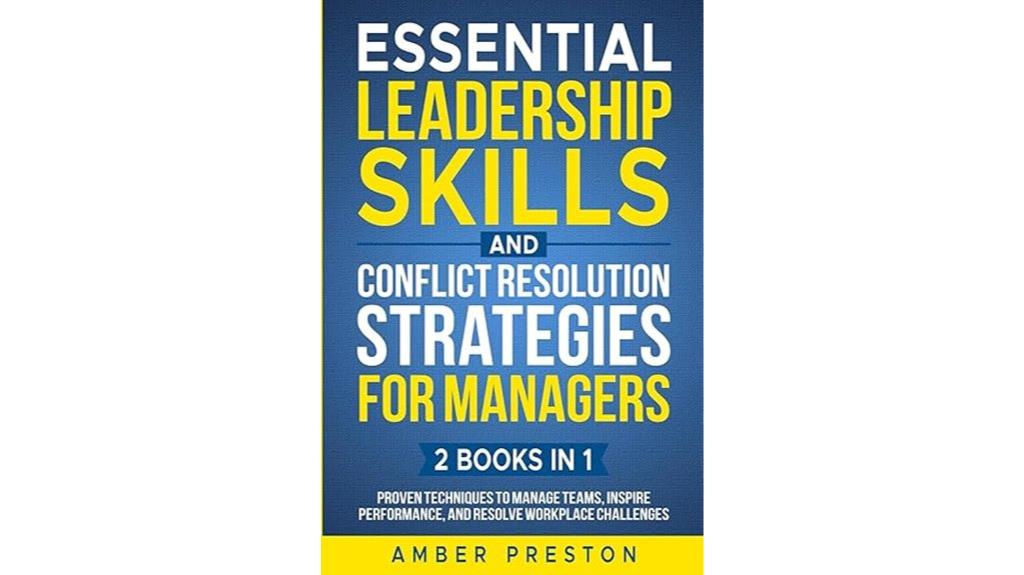
If you’re a manager looking to strengthen your leadership skills while mastering conflict resolution, this collection is an excellent resource. It covers essential skills like clear communication, building trust, and making smart decisions, all pivotal for effective leadership. The books emphasize understanding your personal style, recognizing strengths, and boosting confidence to become a positive influence. They also highlight key areas such as delegation, strategic planning, and managing remote teams. With real-world examples and practical strategies, these books help you shift from managing tasks to inspiring teams, fostering respectful workplaces, and resolving conflicts efficiently—making them invaluable tools for both new and seasoned managers.
Best For: Managers at all levels seeking to enhance their leadership abilities, improve team dynamics, and effectively resolve conflicts in diverse organizational settings.
Pros:
- Provides practical, real-world strategies with actionable steps for immediate implementation
- Covers a comprehensive range of leadership skills and conflict resolution techniques tailored for various situations
- Includes case studies and examples that enhance understanding and applicability
Cons:
- May require dedicated time commitment to fully absorb and practice the concepts
- Some strategies might need adaptation to fit specific organizational cultures or contexts
- The depth of content may be overwhelming for new managers seeking quick, straightforward solutions
Conflict Resolution Guidebook for Managers
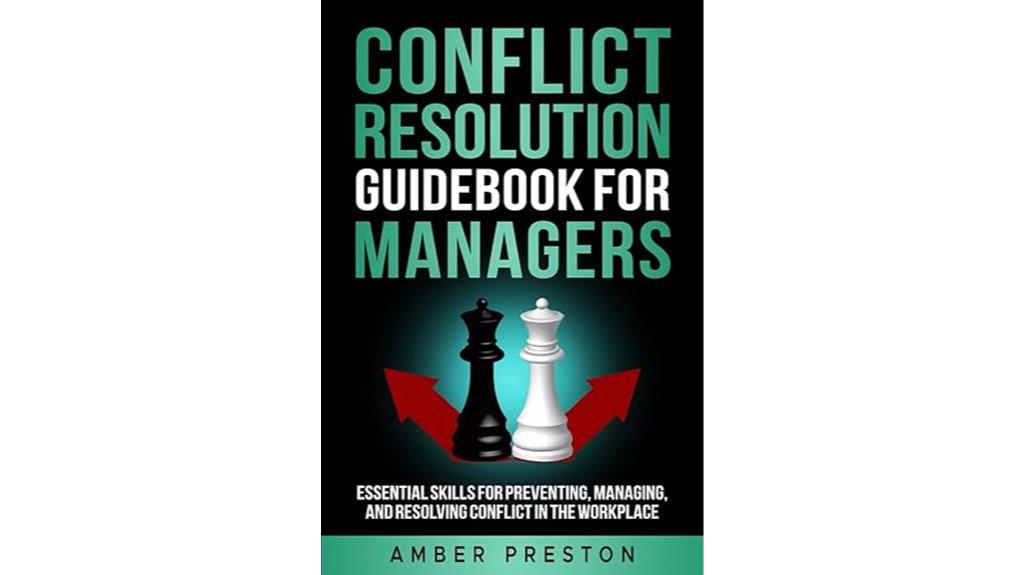
The Conflict Resolution Guidebook for Managers stands out as an essential resource for leaders across all departments, especially those in human resources and team management. I find it invaluable for its practical advice on creating conflict-free workplaces, handling difficult personalities, and turning conflicts into opportunities for growth. The book offers clear strategies like mediating disputes, de-escalating tension, and fostering collaboration. It emphasizes emotional intelligence and cultural awareness, helping managers build harmonious teams. With real-world examples and actionable tips, it equips managers to resolve conflicts ethically and effectively, ultimately strengthening team dynamics and workplace culture.
Best For: Managers, HR professionals, and team leaders seeking practical strategies to resolve conflicts, foster positive workplace culture, and develop emotional intelligence skills.
Pros:
- Provides clear, actionable conflict resolution techniques suitable for various workplace scenarios
- Emphasizes emotional intelligence and cultural awareness to build harmonious teams
- Includes real-world examples and practical tips for ethical and effective conflict management
Cons:
- May require additional training or experience to implement some strategies effectively
- Focuses primarily on corporate settings, less applicable to non-traditional or informal work environments
- Lacks in-depth legal guidance, requiring managers to seek supplementary legal resources for complex disputes
The Key to Overcoming Conflict: A.R.K. Method to Defuse Anger
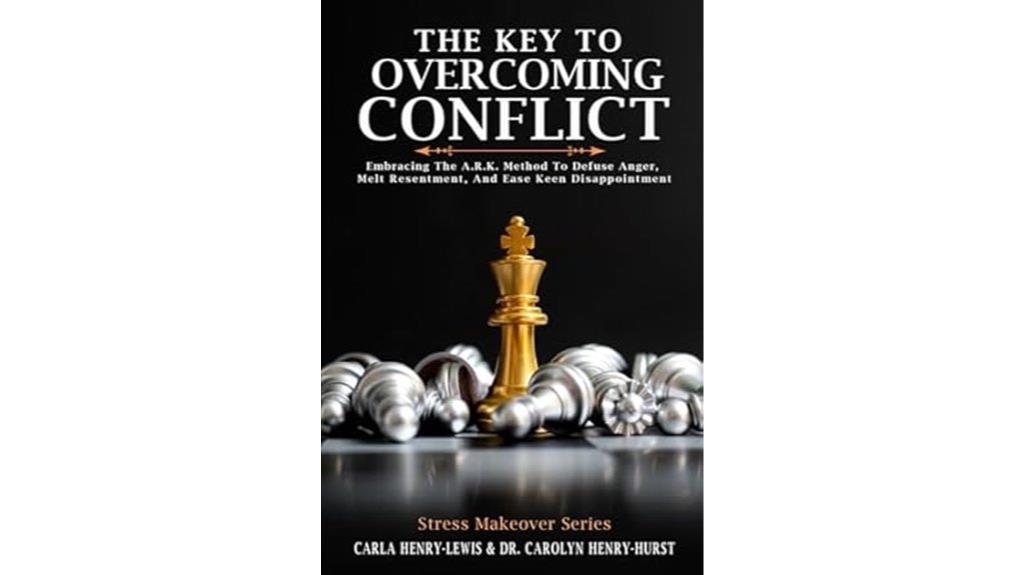
Readers looking for practical tools to manage anger and resolve conflicts will find the A.R.K. method particularly valuable. This approach—Acknowledge, Respond (or Respect), and Know (or Kindness)—offers a simple but powerful framework to defuse anger and foster understanding. By recognizing emotions like resentment or disappointment, you can address conflicts at their root. The method encourages responding thoughtfully instead of reacting impulsively, leading to healthier communication and mutual wins. Suitable for personal relationships, workplaces, or internal struggles, the A.R.K. method helps you stay present, practice empathy, and keep conflicts constructive. It’s accessible, backed by real-life examples, and promotes personal growth through emotional awareness.
Best For: individuals seeking practical, easy-to-implement tools for managing anger, resolving conflicts, and fostering healthier relationships across personal, professional, and internal contexts.
Pros:
- Simple and accessible framework that can be applied in various situations
- Emphasizes emotional awareness and empathy to address conflicts at their root
- Includes real-life examples and practical tips for daily use
Cons:
- May require ongoing practice to fully integrate the techniques into everyday life
- Some readers might prefer more in-depth strategies for complex conflicts
- The focus on emotional awareness might be challenging for those with limited emotional intelligence or self-awareness
Love Talks: Communication Skills for Couples
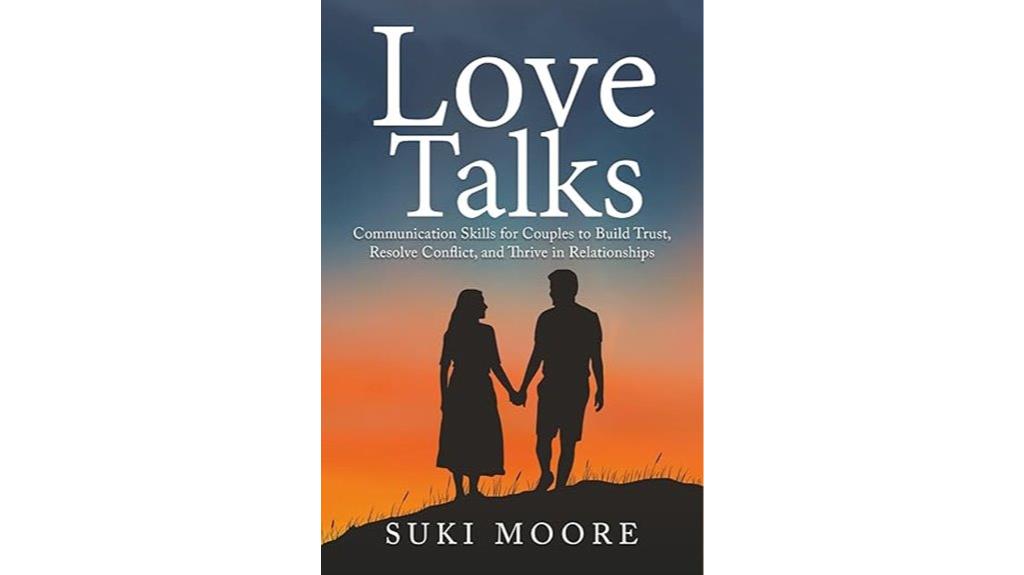
Couples seeking to strengthen their connection will find “Love Talks: Communication Skills for Couples” an invaluable resource. This book emphasizes that effective communication goes beyond words, focusing on building trust, healing, and understanding. It introduces practical tools like the GRACE Method and Safety Anchors, helping couples navigate difficult conversations without defensiveness or frustration. The book highlights the link between mindful dialogue and physical wellness, showing how better communication reduces stress and improves sleep. Its actionable steps are versatile, applicable not only in romantic relationships but also in daily interactions and professional settings. Overall, it offers hope and tangible strategies for creating deeper, healthier connections one conversation at a time.
Best For: couples and individuals seeking to improve their communication skills, deepen emotional connection, and foster healthier relationships through practical, mindful strategies.
Pros:
- Provides clear, actionable tools like the GRACE Method and Safety Anchors for navigating difficult conversations
- Emphasizes the connection between mindful communication and physical/emotional well-being, promoting overall health
- Versatile techniques applicable in romantic, professional, and everyday interactions, enhancing interpersonal skills across contexts
Cons:
- Minor typos may occasionally distract from the content’s clarity
- Some readers may find the focus on acceptance of different communication styles challenging to implement initially
- The book’s practical tips may require consistent practice to see significant long-term results
Conflict Resolution Playbook: Practical Communication Skills
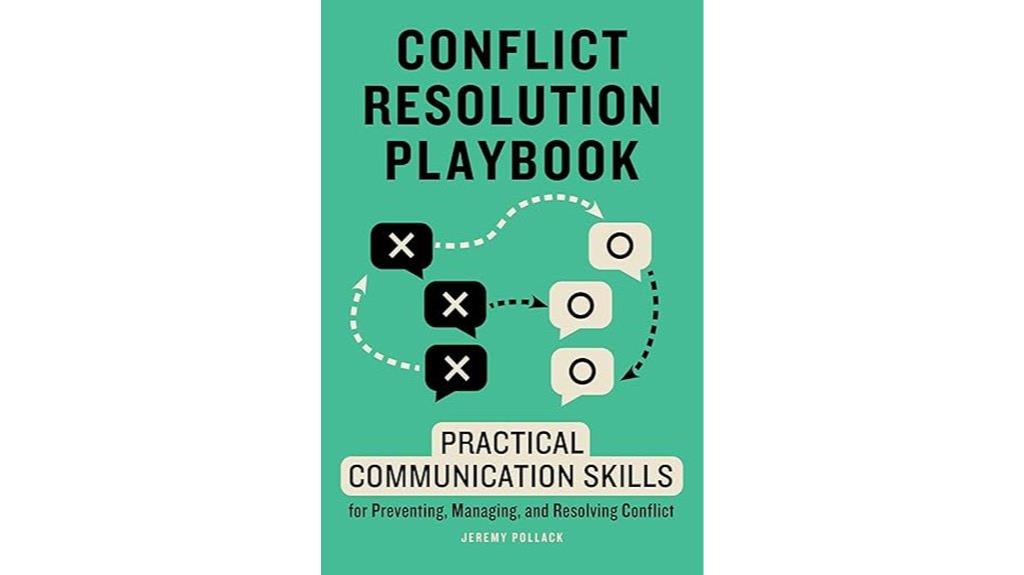
If you’re looking to build solid communication skills to handle everyday conflicts more effectively, the Conflict Resolution Playbook is an excellent starting point. It uses accessible language and helpful diagrams to guide you through fundamental concepts and practical strategies. Designed for those who want to reduce daily stress and improve relationships with spouses, friends, coworkers, or family, it emphasizes understanding others and handling disagreements calmly. The short, relatable scenarios make the ideas easy to apply immediately. While it’s ideal for beginners or those seeking to strengthen basic skills, it may not satisfy those looking for advanced conflict resolution techniques. Still, it’s a valuable tool for transforming everyday interactions.
Best For: individuals seeking to improve their basic communication skills to manage everyday conflicts effectively and build healthier relationships.
Pros:
- Uses accessible language and helpful diagrams for easy understanding
- Offers practical strategies with relatable, real-life scenarios
- Suitable for beginners and those looking to reinforce foundational conflict resolution skills
Cons:
- May be too basic for professionals in high-conflict or advanced conflict management roles
- Lacks in-depth techniques for complex or high-stakes disputes
- Not suitable for those seeking sophisticated or specialized conflict resolution methods
The Next Conversation: Argue Less, Talk More
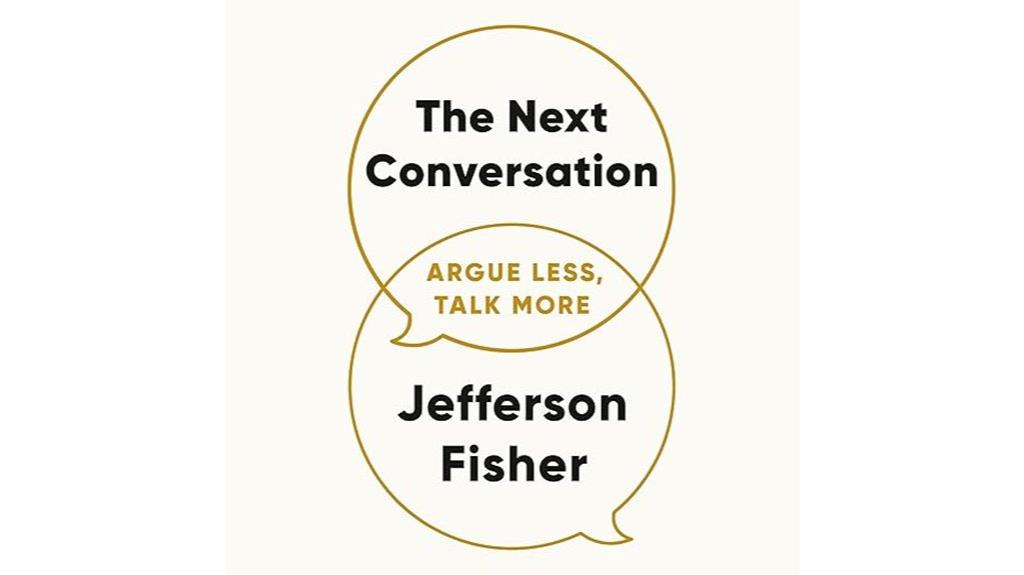
The Next Conversation: Argue Less, Talk More stands out as a practical guide for anyone enthusiastic to improve their communication skills and foster stronger relationships. Fisher offers simple, actionable advice focused on connection rather than winning arguments. His three-part framework helps navigate tough conversations, emphasizing empathy, calmness, and impactful speech. The book stresses that understanding others and managing emotions are key to reducing conflict. It’s especially useful in today’s digital age, where technology can weaken genuine connection. By applying Fisher’s principles, I’ve learned to listen better, stay composed, and communicate with kindness—transforming how I relate to colleagues, friends, and family.
Best For: individuals seeking practical ways to improve their communication, reduce conflicts, and strengthen personal and professional relationships through empathetic and mindful dialogue.
Pros:
- Offers straightforward, actionable advice rooted in common sense and psychological insights.
- Emphasizes connection, empathy, and emotional regulation to improve interactions.
- Provides a clear three-part framework that can be easily applied in various conversations.
Cons:
- May require ongoing effort to change ingrained communication habits.
- Some readers might find the advice too simple or lacking depth for complex conflicts.
- The focus on one adjustment at a time might be slow for those seeking quick results.
Conflict Resilience Book: Negotiating Disagreement
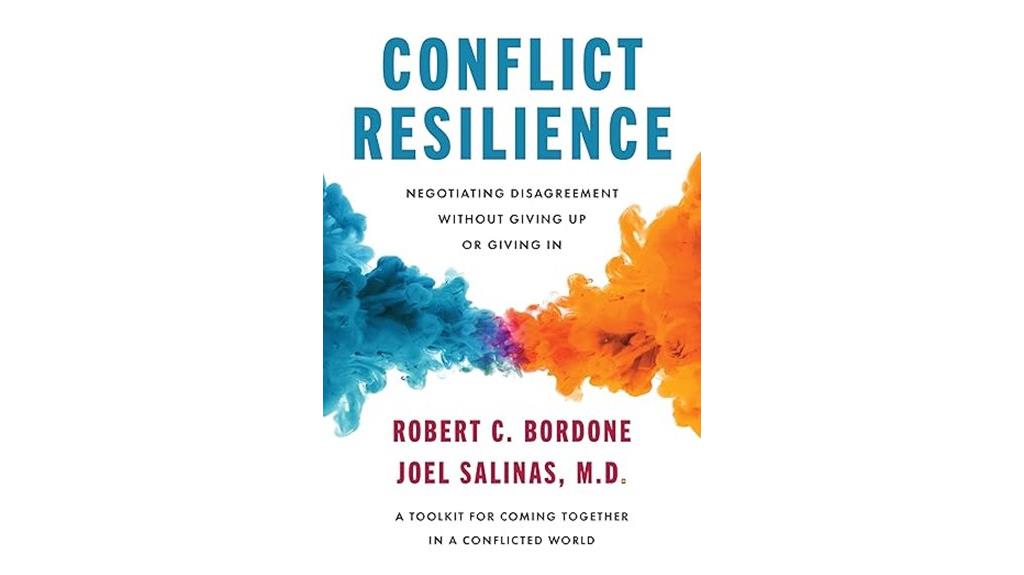
For anyone enthusiastic to turn conflicts into opportunities for growth, the Conflict Resilience Book: Negotiating Disagreement stands out as an essential resource. It teaches you how to navigate disagreements without surrendering or attacking, promoting understanding amid polarization. The authors, Bob Bordone and Dr. Joel Salinas, blend brain science, negotiation tactics, and real stories to make complex ideas relatable. They offer practical tools to recognize conflict, manage emotional discomfort, and respond constructively. This book helps you build empathy and deepen relationships, whether personal or professional. It’s a timely, actionable guide for transforming conflict into connection, making challenging conversations more productive and less divisive.
Best For: individuals, leaders, and teams seeking practical, science-based strategies to navigate conflicts more effectively and foster healthier relationships.
Pros:
- Combines brain science, negotiation tactics, and real-life stories for relatable insights
- Offers practical, immediately applicable tools to manage emotional discomfort and build empathy
- Enhances communication skills and conflict resolution abilities in personal and professional settings
Cons:
- Some readers may find the concepts require conscious effort to implement consistently
- The book may not delve deeply into highly complex or high-stakes conflict scenarios
- Its focus on relational skills might be less detailed for advanced negotiation practitioners
COMMUNICATION AND CONFLICT RESOLUTION: A Biblical Perspective
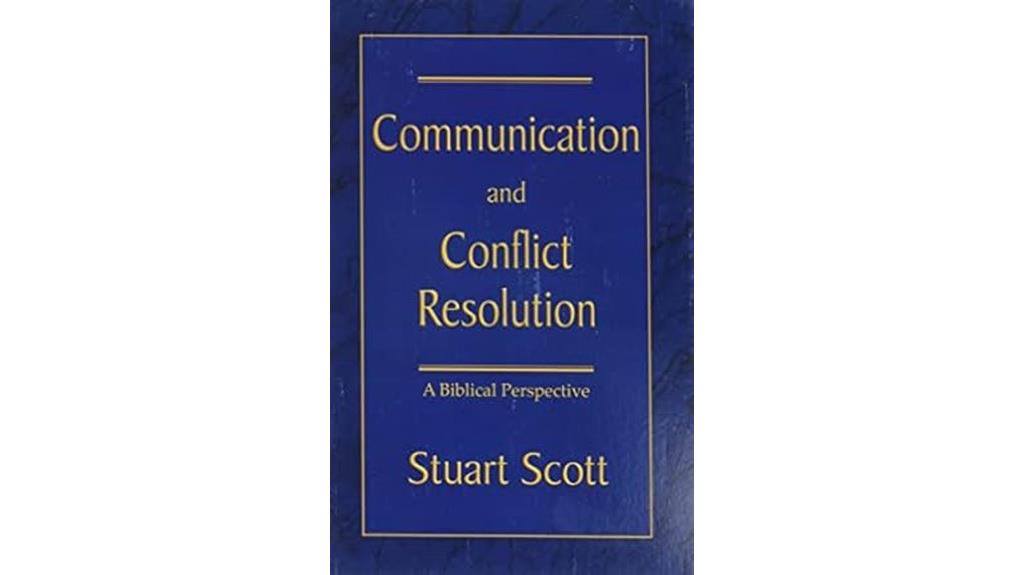
Communication and Conflict Resolution: A Biblical Perspective by Stuart Scott stands out as an essential resource for families, couples, and individuals who want to handle conflicts with biblical wisdom and love. I’ve found it incredibly practical, offering straightforward guidance rooted in Scripture to navigate disagreements peacefully. The book emphasizes love, respect, and understanding, helping me apply biblical principles to real-life situations. It’s especially helpful for managing anger, fear, and anxiety biblically. I appreciate how Scott’s insights deepen my faith while improving my communication skills, making conflicts less stressful and more constructive. This book truly transforms how I approach resolving conflicts with grace and biblical truth.
Best For: individuals, couples, and families seeking biblically based guidance to improve communication and resolve conflicts peacefully.
Pros:
- Provides practical, Scripture-based strategies for conflict resolution.
- Emphasizes love, respect, and biblical principles to strengthen relationships.
- Easy-to-read style makes complex concepts accessible for all readers.
Cons:
- Focuses specifically on Christian perspectives, which may not suit everyone.
- Some readers might desire more in-depth counseling techniques.
- The biblical approach may require a faith-based commitment to fully implement its principles.
Conflict Resolution Guidebook for Managers
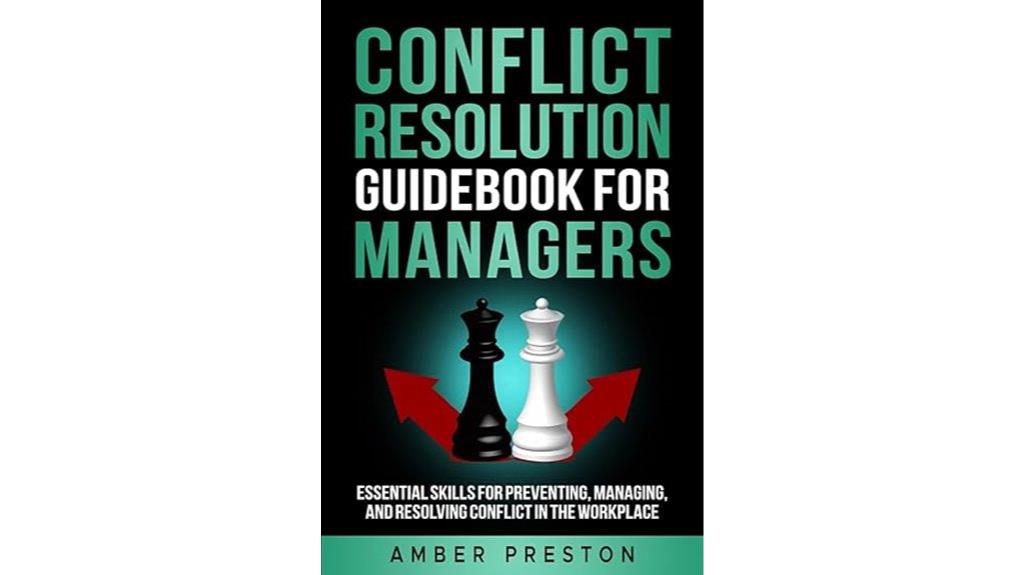
Managers seeking practical strategies to handle workplace conflicts will find the Conflict Resolution Guidebook for Managers an invaluable resource. This book is tailored for managers across all departments, offering research-backed insights on navigating conflicts effectively. It focuses on creating conflict-free environments, managing difficult personalities, and fostering a positive workplace culture. With easy-to-understand techniques like mediating disputes, de-escalating tension, and promoting win-win solutions, it helps managers turn conflicts into opportunities for growth. Emphasizing emotional intelligence and legal considerations, the guide provides actionable tips, real-world examples, and structured steps to enhance team cohesion and communication in today’s complex work environments.
Best For: Managers across all departments seeking practical, research-backed strategies to effectively resolve workplace conflicts and foster a positive organizational culture.
Pros:
- Offers clear, actionable techniques such as mediating disputes and de-escalating tension.
- Emphasizes emotional intelligence to improve communication and conflict management skills.
- Includes real-world examples and structured steps to enhance team cohesion and workplace harmony.
Cons:
- May require time investment to fully understand and implement all strategies.
- Some managers might find the legal considerations complex without additional legal guidance.
- The practical tips may need adaptation for highly unique or sensitive organizational contexts.
Boundaries, Conflict, and People-Pleasing Book
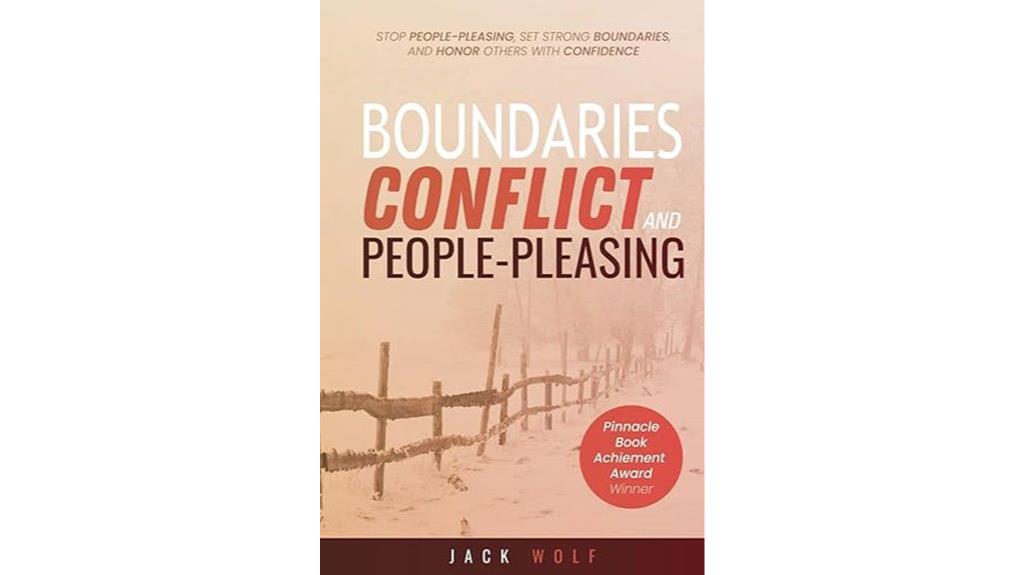
If you struggle with saying no, managing difficult conversations, or overcoming people-pleasing tendencies, this book offers practical tools tailored for you. It provides clear strategies for setting healthy boundaries at home, work, and in relationships, using real-world examples and respectful scripts. You’ll learn to identify patterns rooted in fear or guilt that fuel people-pleasing, and how to reframe conflict as an opportunity for growth. The guidance helps you stand firm without damaging relationships, boosting confidence and self-worth. Many readers find it transformative, empowering them to prioritize their needs with kindness and authenticity while building healthier, more genuine connections.
Best For: individuals seeking practical, compassionate guidance to set boundaries, improve communication, and overcome people-pleasing habits in various areas of life.
Pros:
- Provides clear, step-by-step strategies with real-world examples and scripts
- Empowers readers to handle conflict with confidence, kindness, and authenticity
- Focuses on emotional growth, self-awareness, and building healthier relationships
Cons:
- May require time and practice to fully integrate boundary-setting techniques
- Some readers might find the straightforward approach too simplistic for complex issues
- The concise format might leave those seeking in-depth psychological analysis wanting more
8-Week Couples Therapy Workbook for Restoring Connection
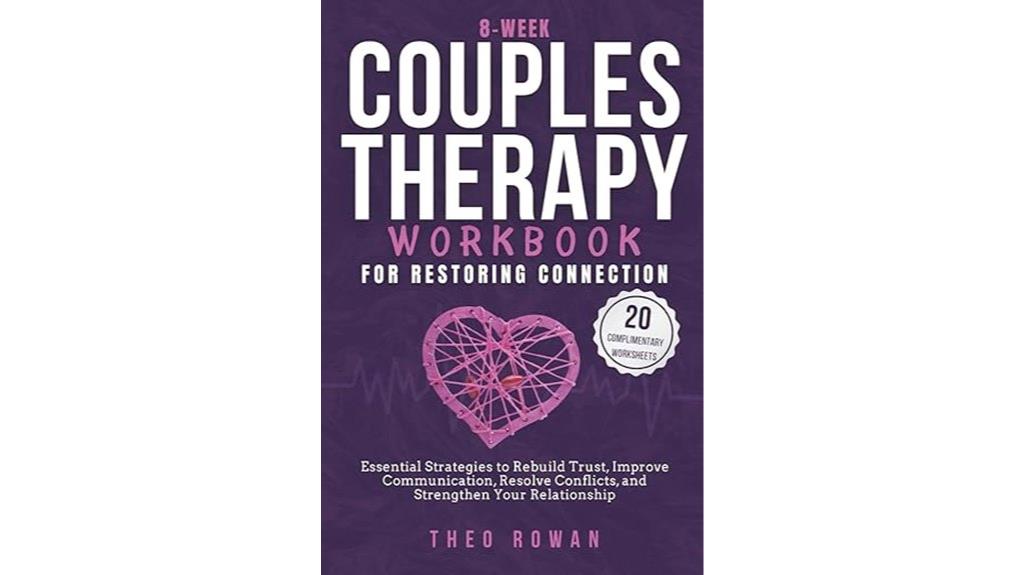
The 8-Week Couples Therapy Workbook for Restoring Connection is an excellent choice for couples who want a practical, step-by-step approach to rebuilding trust and intimacy. I’ve found it to be a compassionate, structured resource that guides couples through honest conversations, small mindful actions, and reflection exercises. Its weekly format breaks down complex issues into manageable steps, making progress feel achievable. The tone is calm and empathetic, emphasizing respect without blame. Many users report that it transforms daily interactions into opportunities for growth, helping couples reconnect and strengthen their bond. It’s a gentle, effective tool for couples ready to prioritize their relationship.
Best For: couples seeking a gentle, structured, and practical guide to rebuild trust, improve communication, and deepen their connection over an 8-week period.
Pros:
- Offers a clear, week-by-week format that makes the process manageable and less overwhelming.
- Emphasizes respectful, honest dialogue and small mindful actions that foster meaningful connection.
- Includes practical tools like conversation starters, reflection prompts, and love language trackers to facilitate engagement.
Cons:
- Some activities may feel surface-level for couples facing deep crises, requiring additional professional support.
- Not a substitute for therapy, so couples needing intensive intervention may need supplementary resources.
- The workbook’s focus on small actions might not fully address complex or longstanding relationship issues.
The Next Conversation: Argue Less, Talk More
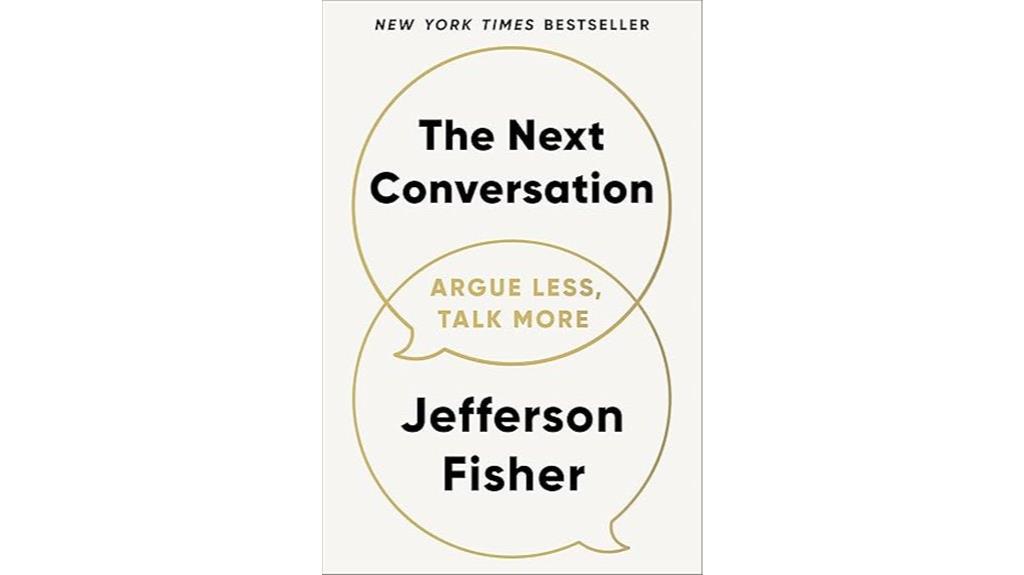
Anyone looking to improve their communication skills and build stronger relationships will find “The Next Conversation” particularly helpful. Jefferson Fisher offers practical advice focused on listening more and speaking intentionally. His three-part framework helps you stay calm, use fewer words for greater impact, and lead with empathy. The book encourages prioritizing connection over winning arguments, recognizing that persuasion can damage bonds. Fisher also addresses challenges posed by digital communication, providing tools to navigate modern interactions effectively. Overall, it’s a straightforward, accessible guide that teaches you how to argue less and talk more, fostering healthier, more meaningful conversations in everyday life.
Best For: individuals seeking practical guidance to enhance their communication skills, strengthen relationships, and navigate modern digital interactions effectively.
Pros:
- Provides clear, actionable strategies rooted in real-world experience
- Focuses on listening, empathy, and emotional regulation to improve conversations
- Easy to understand and apply in various personal and professional situations
Cons:
- Some readers may prefer more in-depth psychological or linguistic analysis
- The framework may require consistent practice to see lasting results
- Limited focus on cultural or contextual differences in communication styles
Difficult Conversations Book: Communication and Conflict Resolution Strategies
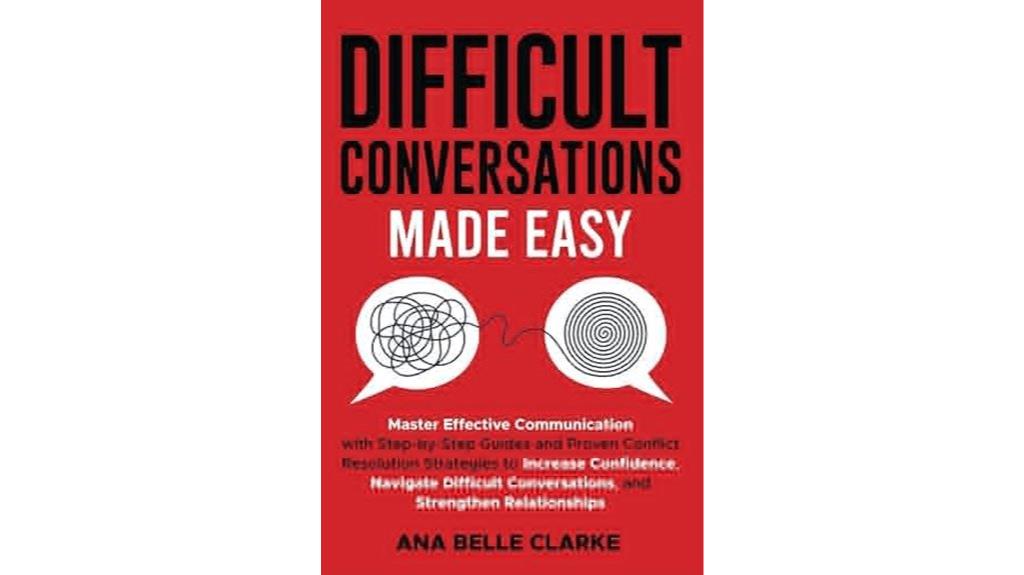
Difficult Conversations offers practical communication strategies that are essential for anyone looking to navigate challenging dialogues with confidence. It emphasizes the importance of effective communication in tough situations, showing how proper framing and strategies can prevent escalation and strengthen relationships. The book highlights core skills like empathy, active listening, and emotional management, providing tools to stay calm and clear during conflicts. Its practical steps help readers express feelings, set boundaries, and handle emotions constructively. Filled with real-life examples, it makes complex concepts accessible and applicable, empowering you to face difficult conversations head-on and achieve better outcomes with less stress.
Best For: individuals seeking practical tools and confidence to handle difficult conversations effectively in personal, professional, or social settings.
Pros:
- Provides clear, actionable strategies for managing challenging dialogues
- Emphasizes core skills like empathy and active listening to improve understanding
- Includes real-life examples to facilitate practical application and learning
Cons:
- May require time and practice to fully integrate techniques into daily interactions
- Some readers might find the concepts repetitive or familiar without additional context
- The focus is primarily on communication strategies, with less emphasis on underlying emotional issues
Resolving Everyday Conflict
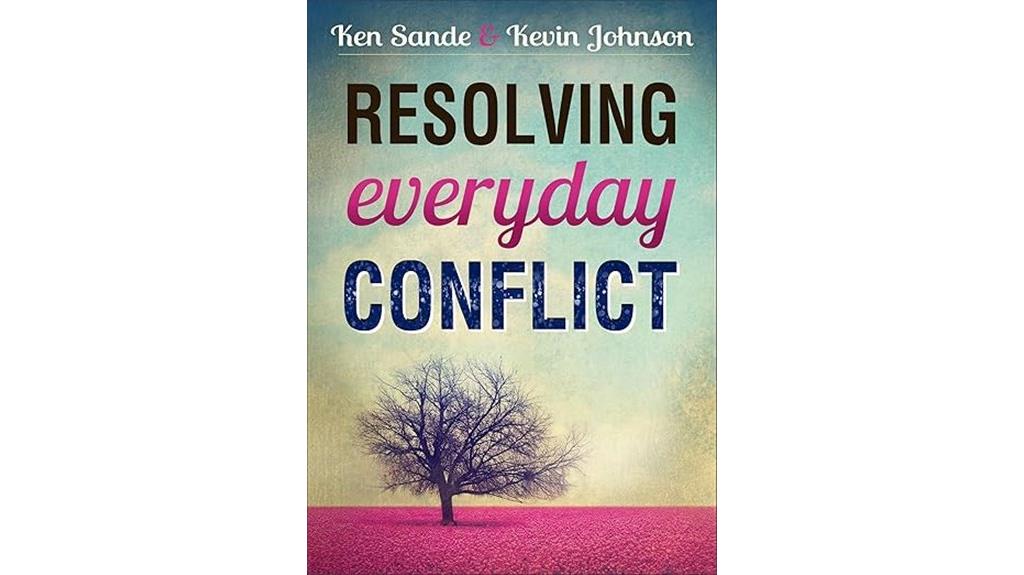
If you’re looking for practical guidance on resolving everyday conflicts, this list of the “14 Best Conflict Resolution Books” is a great place to start. This book offers biblical principles and practical steps to handle conflicts with spouses, children, coworkers, or friends. It emphasizes peacemaking over mere peacekeeping and highlights that peace requires effort. I found its insights on understanding anger and healing relationships incredibly helpful. The book is short, easy to read, and packed with meaningful advice you can apply immediately. Many readers, including myself, consider it an essential tool for navigating daily disagreements and strengthening personal connections.
Best For: individuals seeking straightforward, biblical-based guidance to resolve everyday conflicts in personal and professional relationships.
Pros:
- Offers practical, easy-to-apply steps rooted in biblical principles.
- Short and dense with meaningful content, making it quick to read and understand.
- Suitable for a wide audience, including Christians and non-Christians, and useful in group settings like Bible studies.
Cons:
- Lacks depth for those looking for comprehensive theological or psychological analysis.
- Does not address conflicts involving uncooperative or difficult figures like unapproachable pastors.
- Its brevity may limit coverage of complex or highly emotional conflict situations.
Factors to Consider When Choosing Conflict Resolution Books

When selecting conflict resolution books, I consider how well they align with my goals and the practical advice they offer. I also look at the depth of content to guarantee it’s thorough enough, and I pay attention to the author’s expertise and background. Additionally, I check if the book’s cultural and ethical perspective fits my values and context.
Relevance to Your Goals
Choosing the right conflict resolution book depends heavily on how well its focus aligns with your specific goals. If you’re aiming to improve workplace harmony, look for books emphasizing negotiation and mediation techniques suited for professional settings. For personal relationships, prioritize titles that explore emotional intelligence and communication strategies. Consider whether the book offers practical, actionable steps you can implement immediately to see real progress. Also, check if its approach matches your preferred style—whether that’s calming mediation, assertive negotiation, or understanding cultural nuances. The content should resonate with your context, whether rooted in biblical principles, modern communication, or societal issues. Ultimately, selecting a book that aligns with your goals guarantees you gain relevant insights that truly enhance your conflict resolution skills.
Practical Application Tips
Selecting a conflict resolution book that truly makes a difference means focusing on practical application. Look for books that provide clear, step-by-step strategies I can implement right away in real-life conflicts. It’s essential that the resources include practical examples, case studies, or scenarios relevant to my specific situations, whether at work or home. I want techniques that help me manage emotions, navigate difficult personalities, and overcome communication barriers effectively. Equally important is choosing materials that emphasize ongoing self-assessment and personal growth, so I can develop long-term skills. I also prioritize books that strike a balance between theory and practical tools, ensuring I can apply what I learn immediately and see tangible improvements in my conflict management.
Depth of Content
The depth of content in conflict resolution books varies widely, so it’s important to match the material to your experience level and learning goals. Some books offer concise guides with practical tips, perfect for quick reference or beginners. Others provide detailed analysis, exploring psychological, emotional, and cultural factors that influence conflicts, suitable for advanced learners or professionals. Consider whether the book includes detailed strategies, exercises, and case studies that align with your needs. If you’re seeking foundational knowledge, a surface-level book may suffice, but for mastering negotiation skills or understanding complex dynamics, a more extensive text is better. Think about your goals—whether you want quick tools or a thorough understanding—to choose a book that truly supports your growth.
Author Expertise and Background
When evaluating conflict resolution books, considering the author’s expertise and background can make a significant difference in how useful the material will be for your needs. An author’s professional experience in psychology, negotiation, or conflict management offers credibility and practical insights. Those with backgrounds in counseling, law, or organizational leadership tend to provide strategies grounded in real-world application. Academic credentials and research-based knowledge further boost a book’s reliability, ensuring the techniques are evidence-supported. Authors with extensive publication histories or recognized contributions to the field are often more authoritative. Additionally, personal experience in mediating disputes or resolving conflicts adds authenticity and depth to their advice. Together, these factors help you select a resource that’s both trustworthy and applicable to your specific conflict resolution goals.
Cultural and Ethical Fit
Considering cultural and ethical fit is essential when choosing a conflict resolution book because these factors guarantee the strategies resonate with your values and community standards. I look for books that align with my cultural norms, ensuring the suggested approaches feel relevant and respectful. It’s important to see if the ethical framework matches my principles, whether that’s honesty, respect, or spiritual beliefs. I also evaluate whether the examples and scenarios reflect my background or community, making the lessons more relatable. Additionally, I check if the book addresses cultural differences in communication and conflict perceptions, promoting inclusive strategies. Finally, I verify the methods are ethically sound and compliant with organizational or societal standards, so I can confidently apply them without compromising my values.
Frequently Asked Questions
How Do Conflict Resolution Books Improve Emotional Intelligence?
Conflict resolution books improve my emotional intelligence by teaching me to recognize and manage my emotions better. They provide insights into understanding others’ feelings and perspectives, which helps me stay calm and empathetic during disagreements. These books also offer practical strategies to communicate effectively, fostering stronger relationships. By applying their lessons, I become more self-aware and better equipped to handle conflicts constructively, ultimately boosting my emotional intelligence.
Can These Books Help With Online or Virtual Conflicts?
Absolutely, these books can help with online or virtual conflicts. I’ve found that they provide strategies to navigate digital misunderstandings, like tone misinterpretations or lack of non-verbal cues. By applying their lessons, I learn to communicate more clearly and empathetically online. They remind me to stay calm, listen actively, and address issues directly, which makes resolving virtual conflicts more manageable and less stressful.
Are Conflict Resolution Books Suitable for Children and Teenagers?
Yes, conflict resolution books can be suitable for children and teenagers. I’ve seen many tailored specifically for younger audiences, teaching them how to manage disagreements effectively. These books often use relatable stories, simple language, and practical tips that resonate with kids and teens. I recommend choosing age-appropriate titles to help young people develop vital communication skills early on, setting a foundation for healthier relationships as they grow.
How Quickly Can I Expect to See Communication Improvements After Reading?
Imagine planting a seed today; with time and care, it blossoms into a vibrant, strong tree. That’s how I see communication improvements after reading conflict resolution books. Usually, you’ll notice small changes within days—like smoother conversations or fewer misunderstandings—and more significant shifts over weeks. Consistent practice and applying what you learn speed up this growth, making your communication more effective, confident, and resilient over time.
Do These Books Address Cultural Differences in Conflict Resolution?
Yes, many of these books do address cultural differences in conflict resolution. I’ve found they offer valuable insights into how cultural backgrounds influence communication styles and conflict management. By understanding these nuances, I can adapt my approach to diverse situations. These books help me become more empathetic and effective in resolving conflicts across different cultural contexts, making my skills more versatile and respectful of various perspectives.
Conclusion
If you’re looking to improve your conflict resolution skills, these books can truly transform how you communicate. Imagine diffusing a heated workplace disagreement using the A.R.K. method I learned from one guide, turning tension into teamwork. Whether steering personal disputes or professional challenges, mastering these strategies helps you stay calm, connect better, and find solutions faster. Start exploring today, and watch your relationships and leadership grow stronger with every conversation.









